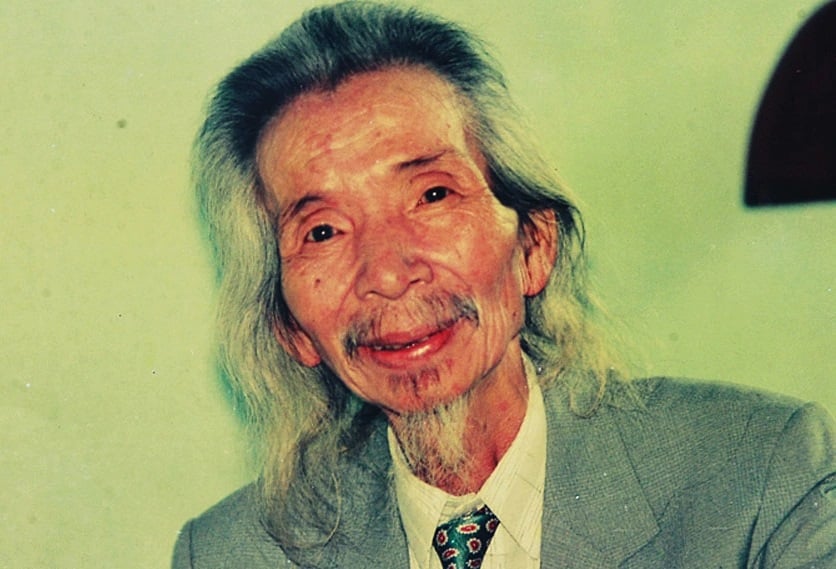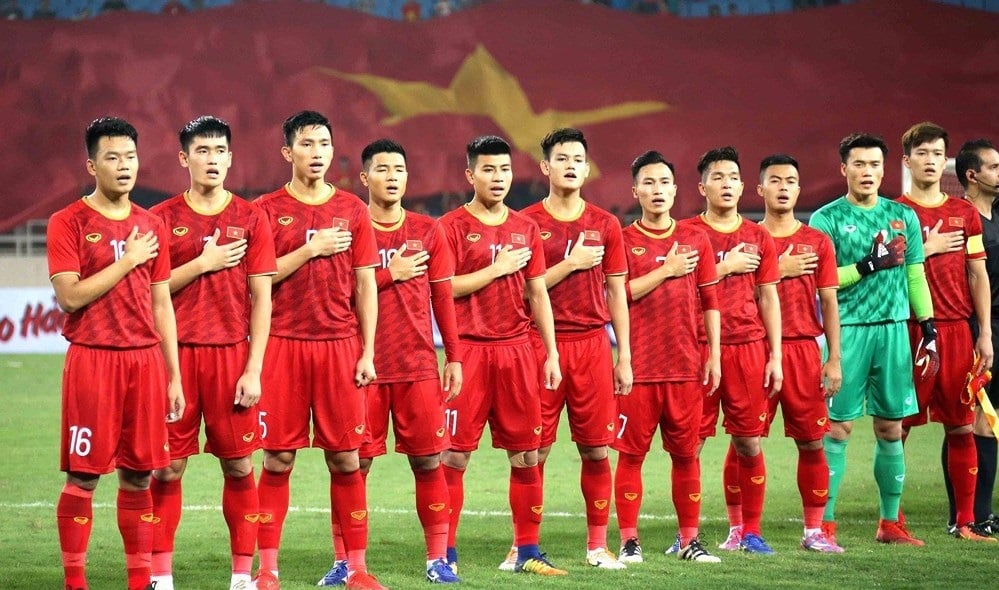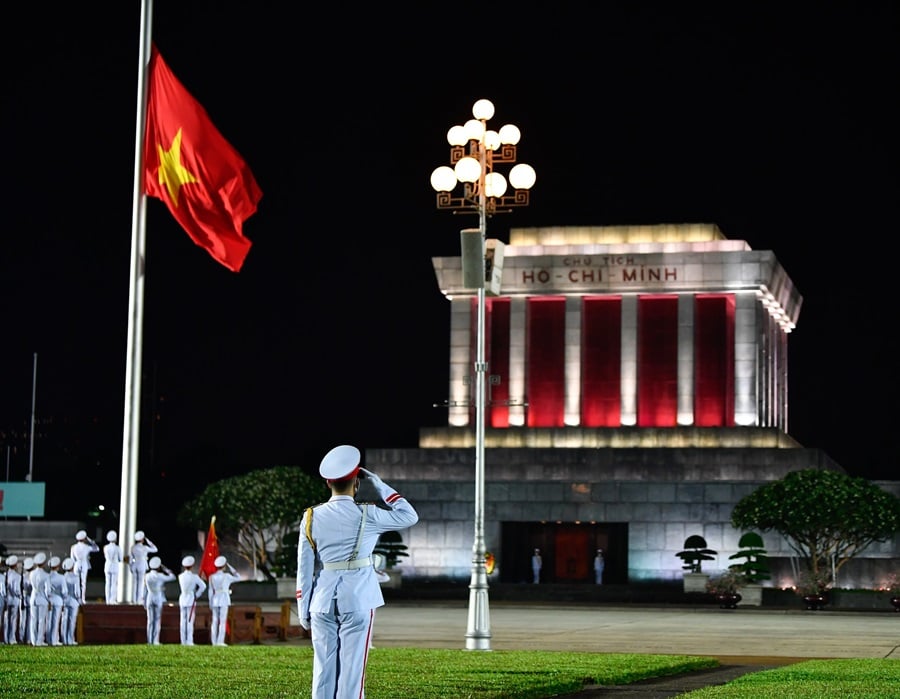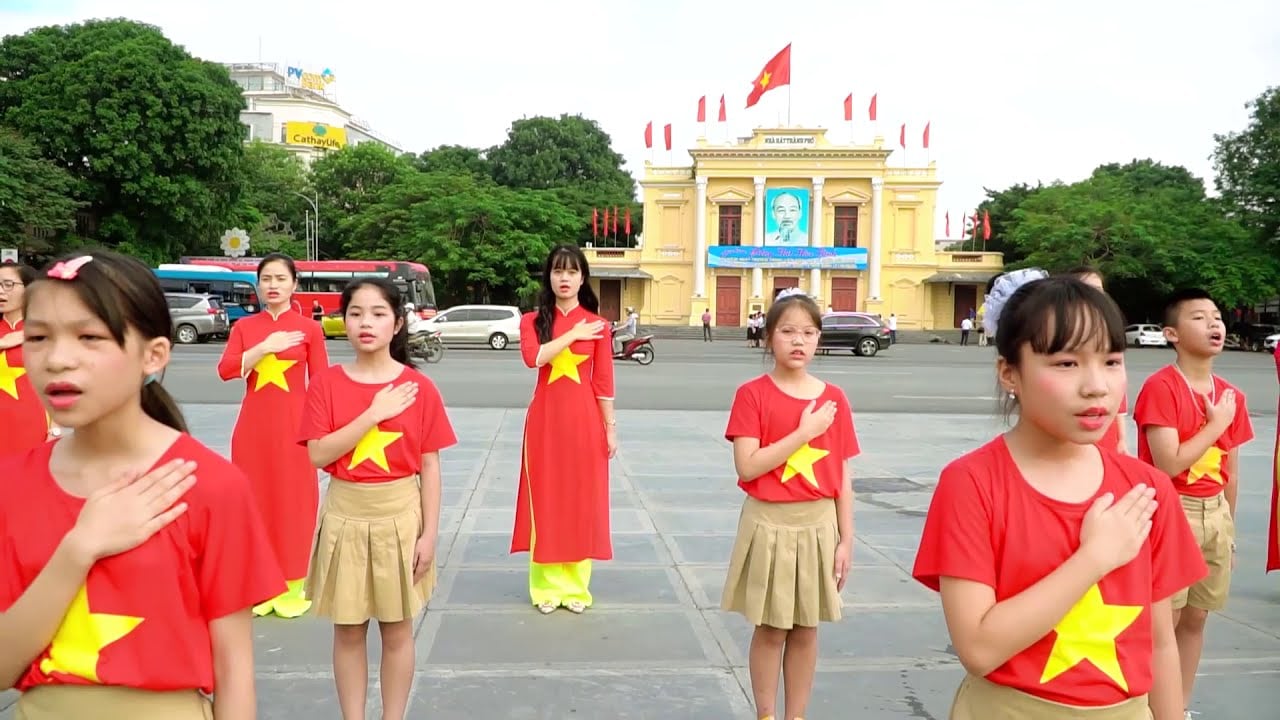In the heart of every Vietnamese citizen, there resonates a melody that encapsulates the essence of their nation’s spirit – “Tien quan ca,” the national anthem of Vietnam. More than just a composition, it embodies the resilience, courage, and unwavering patriotism that have defined Vietnam’s journey through history.
Vietnam’s national anthem, “Tiến quân ca,” stands as a testament to the nation’s unwavering spirit and enduring legacy. With its resonant melodies and poignant lyrics, this anthem encapsulates the collective heartbeat of Vietnamese people, echoing the struggles, triumphs, and unyielding patriotism that have defined Vietnam’s narrative. In this exploration, we will delve deep into the heart of this anthem, tracing its origins and unraveling its significance.

1. An overview of the historical background of the Vietnamese national song
1.1. The origin of the Vietnamese national song
The origin of Vietnam’s national anthem, “Tien quan ca,” is rooted in the historical backdrop of Vietnam’s revolutionary struggle. In the winter of 1944, during a period of intense national fervor, musician Van Cao composed this anthem under challenging circumstances. At that time, he was approached by Vu Quy, a Viet Minh official, who entrusted him with the task of creating a song for the revolutionary army.
Despite his lack of familiarity with the battlefields and the revolutionary soldiers, Van Cao embarked on the task with determination. He roamed the streets of Hanoi, including Pho Ga, Hang Bong, and Bo Ho, seeking inspiration. In the midst of the harsh winter days marked by hunger and hardship, he crafted the initial notes of “Tien quan ca” in a modest attic at 45 Nguyen Thuong Hien Street, Hanoi.
This anthem, with its sacred and heroic melodies, became a symbol of Vietnam’s resilience and determination during its pre-August Revolution period. The song not only encapsulates the spirit of the nation’s struggle for independence but also represents the unwavering resolve of Vietnamese people.

Here are some important milestones for Vietnam’s national anthem:
- August 13, 1945: President Ho Chi Minh formally approved “Tien quan ca” as the national anthem of the Democratic Republic of Vietnam.
- August 17, 1945: “Tien quan ca” was sung for the first time in front of a vast crowd.
- August 19, 1945: At the same venue, amidst the atmosphere of upheaval as power was transferred to the people under the nation’s flag, the Young Pioneer Team sang “Tien quan ca.”
- September 2, 1945: “Tien quan ca” was officially and ceremoniously performed during the Declaration of Independence at Ba Dinh Square, marking the birth of the Democratic Republic of Vietnam.
1.2. The significance of the Vietnamese national song
The significance of Vietnam’s national anthem, “Tiến quân ca,” extends far beyond its musical beauty. It stands as a powerful emblem of the nation’s spirit and resilience. This anthem has woven an emotional connection between multiple generations of Vietnamese people who have endured the arduous and triumphant chapters of the history of Vietnam. It emerged in a distinctive context, both for its composer and the entire Vietnamese nation.
Throughout the years, “Tien quan ca” has served as a rallying cry, marching alongside Vietnamese people in their relentless pursuit of national independence. It has been a steadfast companion during the struggles to build a socialist Vietnam, representing the aspirations and determination of the people. In essence, it has become a cherished source of pride for the nation, embodying the spirit of unity, resilience, and unwavering patriotism that characterizes Vietnam’s rich cultural heritage.

2. Vietnamese national anthem lyrics in Vietnamese and translation
2.1. The first part of Vietnam’s national anthem
The lyrics of Vietnam’s national anthem, “Tien quan ca,” are a lyrical tapestry that weaves together the essence of Vietnam’s history, struggle, and aspirations. Here are the Vietnamese national anthem lyrics in Vietnamese:
Đoàn quân Việt Nam đi
Chung lòng cứu quốc,
Bước chân dồn vang trên đường gập ghềnh xa,
Cờ in máu chiến thắng mang hồn nước,
Súng ngoài xa chen khúc quân hành ca,
Đường vinh quang xây xác quân thù,
Thắng gian lao cùng nhau lập chiến khu,
Vì nhân dân chiến đấu không ngừng,
Tiến mau ra sa trường.
Tiến lên! Cùng tiến lên!
Nước non Việt Nam ta vững bền.
The Vietnamese national anthem in English:
The Vietnamese army marches,
United, to save the nation,
Footsteps resound on the rugged, distant road,
The flag, imprinted with the blood of victorious battles, carries the soul of the nation,
Rifles far away blend into the marching song,
The path of glory is built upon the enemy’s corpses,
Overcoming hardships, together we establish revolutionary bases,
For the endless struggle of the people,
Advance quickly to the battlefield.
March on! Together, march on!
Our Vietnamese homeland stands strong.

The opening lines invite all Vietnamese to march forward, united and resolute, to save the nation. Throughout the anthem, there are references to the sacrifices, hardships, and glory of the nation’s journey towards independence and unity. These lyrics pay homage to the resilience and unity of Vietnamese people while embodying the spirit of a nation that has persevered through countless trials and emerged with its head held high.
2.2. The second part of Vietnam’s national anthem
Đoàn Quân Việt Nam đi
Sao vàng phấp phới
Dắt giống nòi quê hương qua nơi lầm than
Cùng chung sức phấn đấu xây đời mới
Đứng đều lên gông xích ta đập tan
Từ bao lâu ta nuốt căm hờn
Quyết hy sinh đời ta tươi thắm hơn
Vì nhân dân chiến đấu không ngừng
Tiến mau ra sa trường
Tiến lên! Cùng tiến lên!
Nước non Việt Nam ta vững bền.
Here is the rough translation of Vietnam’s national anthem:
The Vietnamese army marches,
With shining golden stars,
Leading our homeland’s descendants through the coal mines,
Together striving to build a new life,
We stand united, breaking the chains that bind us.
For how long have we swallowed our anger,
Determined to sacrifice, to make our lives brighter.
For the endless struggle of the people,
Advance quickly to the battlefield.
March on! Together, march on!
Our Vietnamese homeland stands strong.

Singing one or both verses of Vietnam’s national anthem depends on the context, space, timing, and content of the event. However, it is always necessary to ensure sacredness and compliance with international protocols for diplomatic events.
